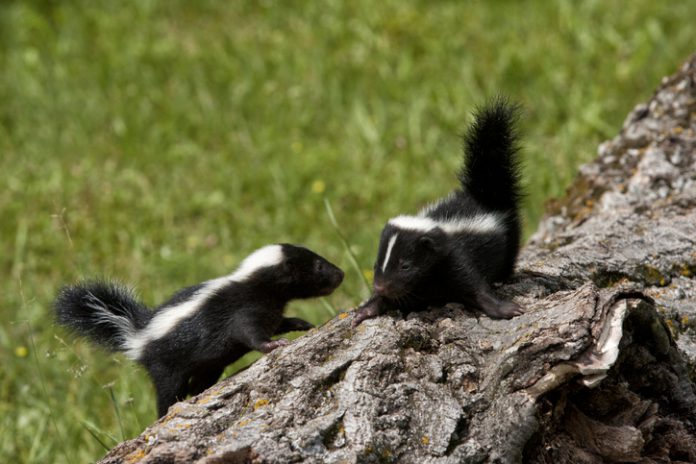Encountering wildlife around your property is not uncommon, but when it comes to skunks, their presence can be both a nuisance and a potential threat. Recognizing the signs of skunks on your property is the first step to addressing the issue effectively. In this blog, we’ll explore common signs that indicate skunks have made themselves at home and offer guidance on what to do if you find these striped nocturnal visitors lurking around.
Distinctive Odor
One of the most obvious signs of skunks is their pungent, musky odor. If you catch a whiff of a foul smell reminiscent of rotten eggs, it’s likely that skunks are nearby. The best step to take is to identify potential entry points around your property, such as beneath decks or sheds, and seal them to discourage skunks from taking up residence. Additionally, consider using odor-neutralizing products to mitigate the smell temporarily.
Digging and Burrowing
Skunks are proficient diggers, and they may create burrows or holes in your yard or garden in rsearch of insects and grubs. To combat this problem, Regularly inspect your property for signs of digging, and address any pest infestations promptly. Install barriers or mesh around vulnerable areas to deter skunks from digging.
Damaged Lawns and Gardens
Skunks are opportunistic feeders and may damage lawns and gardens in their quest for food. Turf damage and upturned soil in search of insects are common signs. Consider implementing pest control measures to reduce insect populations, making your property less appealing to skunks. Fencing and motion-activated lights can help deter them from foraging in your garden.
Tracks and Footprints
Skunks leave distinctive tracks with claw marks and a unique pattern that resembles an inverted V. It’s important that you familiarize yourself with skunk tracks and regularly inspect your property for signs of their presence. This can help you identify potential entry points and areas that require reinforcement.
Nocturnal Activity
Skunks are primarily nocturnal, so sightings are more likely during the evening or early morning hours. So, if you notice skunks becoming regular visitors, consider installing motion-activated lights or sprinklers to discourage their nocturnal activities.
Visual Confirmation
Direct visual confirmation of skunks in or around your property is a clear indicator of their presence. Exercise caution and avoid direct contact with skunks, as they may spray when feeling threatened. Contact a wildlife removal professional for safe and humane removal if the situation becomes unmanageable.
What to Do If You Have Skunks
Hiring a professional pest control company to address a skunk infestation proves invaluable for several reasons. These experts possess the knowledge and experience to safely and humanely remove skunks, minimizing the risk of potential encounters and unpleasant encounters.
Professionals can accurately identify entry points, implementing strategic measures to prevent re-entry. Moreover, they have access to specialized tools and techniques that ensure efficient skunk removal without causing harm to the animals or risking the homeowner’s safety. With their expertise, a professional pest control company brings a comprehensive solution, offering peace of mind and a skunk-free environment for homeowners.
Other steps you can take include:
- Identify and Seal Entry Points: Conduct a thorough inspection of your property to identify potential entry points, such as gaps or openings beneath structures. Seal these points to prevent skunks from accessing hiding spots.
- Use Natural Deterrents: Implement natural deterrents, such as ammonia-soaked rags or commercial repellents, in areas where skunks are likely to frequent. These measures can help discourage skunks from lingering on your property.
- Secure Trash and Food Sources: Skunks are attracted to easily accessible food sources. Secure trash cans with tight-fitting lids and avoid leaving pet food outside overnight.
- Install Fencing: Install fencing around vulnerable areas, such as gardens and potential den sites. Bury the fence a few inches underground to prevent skunks from digging underneath.
Final Thoughts
Recognizing signs of skunks on your property is crucial for effective and humane management. By understanding their behavior and taking proactive measures, you can create an environment that is less inviting to skunks. If the situation escalates, consulting with professionals ensures a safe and responsible approach to skunk removal, allowing you to reclaim your property without harm to both you and these curious striped neighbors.













